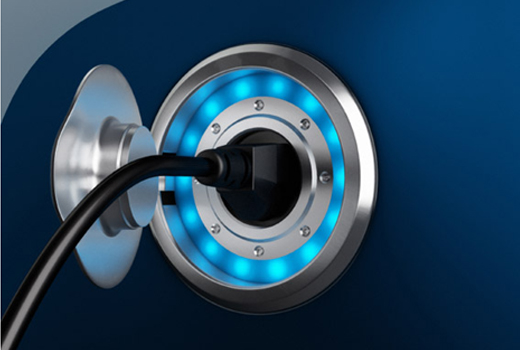New Technology for a Greener Future: 12-Minute Cell Phone & Electric Car Charging
Sales of plug-in electric (PEV) and hybrid cars tripled in 2012 and are expected to double again in 2013. Still, they represent only a one digit percent of the 13 million vehicles sold in the United States last year and only one percent of global production. This is a tepid response to the urgent need to reduce carbon emissions and to lower dependency on fossil fuels worldwide. One of the primary roadblocks preventing consumers from shifting to emission-free vehicles is the availability of charging stations – and the long recharging times – once they locate one. Because it takes several hours to recharge, many electric vehicle (EV) owners now plug in their cars at home overnight so they will have juice for their morning commutes. But what if they want to take a day trip beyond their normal range, are not near home or don’t have hours to wait to “fill-up”?
The answer is a new, ultra-fast charging technology from Potential Difference, Inc. (PDI), which can fully recharge a vehicle in minutes, not hours, without overheating the battery. Leveraging this same patented process, PDI is also licensing this technology to consumer electronics manufacturers. Used in an integrated circuit, the company’s new battery charger can safely and quickly re-power laptops and off-the-shelf batteries in millions of consumer electronics products in minutes. Soon to be the norm, electronic gear of all types (mobile phones, media players, laptops, tablets, still and video cameras, power tools) will be able to recharge in as little as 10 minutes. PDI is currently crowdfunding this technology at indiegogo.com/projects/charge-your-cell-phone-or-electric-car-battery-in-minutes.
Past is Prologue
From the time I was a young boy of around six, I’ve been acutely aware of the suffering in the world and wanted to help stop it. Born and raised on the Southside of Chicago – the son of a Caribbean immigrant father from Barbados – I dreamt of bettering the world through science and business. My passion for learning, which included my unusual electricity experiments that blacked out the entire apartment building, led me to Harvard. This became a great platform from which to launch “world change.”
My EV journey began with the conversion of a new luxury car, an Acura TL, to an all-electric vehicle. It had 40 kilowatt hours of lithium ion batteries, a 150 mile range at 55 mph, and a top speed of more than 100 miles per hour. Having lived in Atlanta, I had previously been involved with an EV project at Georgia Institute of Technology. When they heard about PDI’s electric car conversion, they offered the company an exclusive license for two rapid battery charging patents. PDI built an experimental prototype and then a production-sized prototype for electric vehicles. The prototype has a total capacity of 102.4 kilowatts with variable outputs of 0 to 1280 amps and 0 to 80 volts for industrial vehicles using lead acid batteries. The battery packs have dozens of volts and variable outputs of 0 to 200 amps and 0 to 512 volts for passenger vehicles using lithium ion batteries whose battery packs have hundreds of volts.
PDI signed a proof of concept testing agreement with one of the nation’s largest industrial electric vehicle manufacturers. After successful initial testing, they shipped the prototype to their research and development facility for further testing, which was also successful. PDI is now collaborating with Chargetek, a charger manufacturer that ships thousands of chargers monthly for various industries. Chargetek is a member of our Indiegogo Crowdfunding campaign team to produce rapid chargers for both electric vehicles and consumer electronics batteries. PDI continues to do further research and development to improve its already marketable technology.
Lithium ion batteries are used in cell phones, cameras, tablets, laptops, power tools and electric vehicles. PDI’s crowdfunding campaign offers a universal rapid charger for cell phone batteries. The charger can be plugged into 220 – 240 volt outlets as well as 110v. The company will manufacture different versions of the charger for different plugs in nations worldwide, including car plugs.
A Green Mission

© iStockphoto.com/Neustockimages
Although my experience thus far has shown me that change is more complicated than I imagined, I take solace in knowing that PDI’s technology will have an impact on the environment. The technology is particularly useful because it does not rely on development of new battery technology. Existing batteries have been charged staying well below maximum charging temperatures recommended by battery manufacturers: 70 percent state of charge in 10 minutes, 80 percent in 12 minutes and 100 percent in 16 minutes. And, these results may improve with further development. This means that users of cell phone and other consumer electronics, such as computers, tablet computers, cameras and portable power tools, will not be stranded when they have an urgent need to revive their batteries. In addition, charging an electric vehicle with speeds closer to gasoline refueling times will speed the growth of the electric vehicle industry. The resultant reduction in emissions will improve the health and welfare of the Earth and all its inhabitants.
Currently, the largest market for fast battery charging is cell phones and laptop computers, which is why PDI choose that platform for its Indiegogo crowdfunding program. However, electric vehicle battery charging is an emerging large market. Residing in both markets will strengthen PDI’s ability to have a larger eventual impact as it pursues its mission. Below are some of the benefits that faster battery charging offers:
- Electric automobile charging stations need re-charge times similar to gas refueling times using off-the-shelf batteries. PDI is becoming competitive with its 12-minute charge time while current state-of-the-art time is now 30 minutes;
- Among industrial vehicles, 95 percent of forklift trucks are forced to swap one-ton batteries between shifts. This is because fast charging alternatives require about 3.5 hours but regularly overheat and damage the batteries, thus releasing toxic fumes. PDI eliminates these problems and enable up to a 75 percent savings for industrial rapid charging. This doubles the revenue for automotive charging stations with charge times of 30 to 90 minutes for lead acid batteries used in industrial electric vehicles;
- Owners of devices like cell phones, laptops and power tools are often stranded waiting several hours to recharge. PDI’s 12-minute recharge for lithium ion batteries can solve that problem directly from a 110 volt outlet.
The impact can be seen by the size of the affected markets:
- Worldwide device sales included 1.7 billion cell phones in 2012, according to International Data Corporation (IDC), and 195 million notebook computers in 2011, according to ResearchInChina.com;
- According to the Industrial Truck Association, 503,681 electric forklifts were shipped worldwide in 2011 and Modern Materials Handling expects 820,000 in 2014. About five million electric forklift trucks exist in the world today, which equates to a potential market of $15 billion for PDI rapid chargers or $2.46 billion per year;
- TechNavio predicts an $8.1 billion global electric vehicle charging station market by 2014. Pike Research forecasts 1.5 million charging locations in the United States by 2017 with 7.7 million locations worldwide; 150,000 of these are predicted to be fast-charging stations.
Test Results Summary
| Battery Chemistry |
Chemistry Application |
Charge Range | Normal Times | PDI Time | Manufacturer Max Safe Temp |
PDI Temp |
|---|---|---|---|---|---|---|
| Lithium Ion | Electric Cars, Cell Phones, Laptops, Power Tools, etc. |
20% to 80% | Slow: 3.5 hrs Fast: 30 min | 12 min | 85°C | 42°C |
| Small Flooded Lead Acid | Industrial Electric Vehicles | 20% to 100% | 6 to 8 hrs | 31 min | 49°C | 49°C |
| Large Flooded Lead Acid | Forklift Trucks | 20% to 100% | 6 to 8 hrs | 120 min | 60°C | 55°C |
PDI (potentialdifference.com) is well positioned to provide environmental solutions to this burgeoning market. It was one of 30 companies selected nationwide by the U.S. Department of Energy’s National Renewal Energy Laboratory to present at their annual Industry Growth Forum in 2011, the nation’s premier entrepreneurial event. It was also one of 10 companies selected to receive commercialization assistance in 2011 by Illinois’ Smart Grid Regional Innovation Cluster, a collaborative effort with the U.S. Department of Energy, Illinois Science and Technology Coalition, and Clean Energy Trust. PDI hopes to deliver on its mission of assisting in the development of greener technology, and I hope to deliver upon my boyhood dream of making the world a better place with science and business. To help PDI crowdfund its new technology please go to indiegogo.com/projects/charge-your-cell-phone-or-electric-car-battery-in-minutes.





























